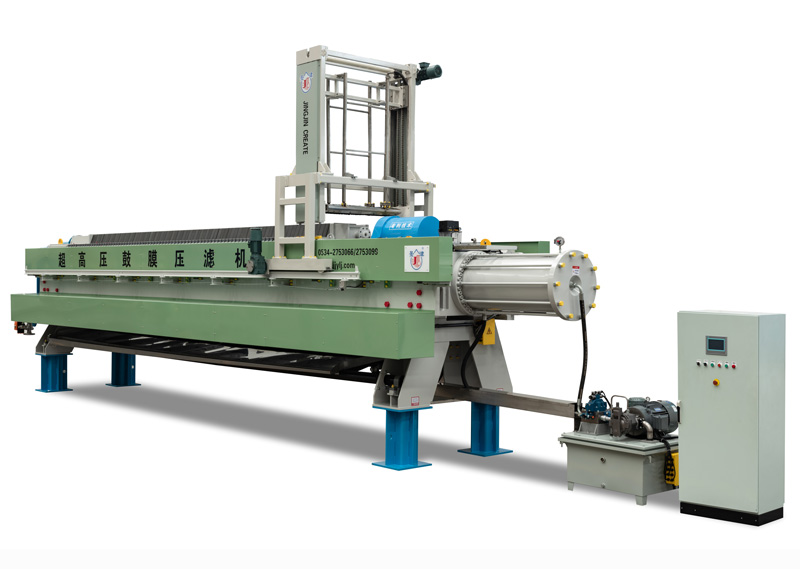A sludge filter is a type of filtration system that is used to remove solid particles from sludge. Sludge is a semi-solid or liquid residue that is generated during the treatment of wastewater, sewage, or industrial effluent. Sludge filters are used to remove the solid particles from the sludge so that it can be safely disposed of or further processed.
Sludge filters can take many forms, but they generally consist of a filter medium that is used to trap the solid particles in the sludge. The filter medium can be made from a variety of materials, such as sand, gravel, activated carbon, or synthetic fibers. The sludge is passed through the filter medium, and the solid particles are trapped while the filtered liquid is collected and discharged.
Sludge filters can be used in a range of applications, including wastewater treatment, industrial processes, and agricultural operations.
Some common types of sludge filters include:
Belt filter presses: Belt filter presses use a series of belts to compress and dewater sludge, removing the solid particles and producing a cake-like material that can be disposed of or further processed.
Plate and frame filter presses: Plate and frame filter presses use a series of plates and frames to compress and dewater sludge, removing the solid particles and producing a cake-like material that can be disposed of or further processed.
Gravity filters: Gravity filters use a filter medium, such as sand or gravel, to remove solid particles from sludge. The sludge is poured over the filter medium, and the filtered liquid is collected and discharged.
Drum filters: Drum filters use a rotating drum to filter sludge, removing the solid particles and producing a cake-like material that can be disposed of or further processed.
Sludge filters offer several advantages over other types of sludge treatment methods, including:
Reduced volume: Sludge filters can significantly reduce the volume of sludge that needs to be disposed of, which can reduce disposal costs and improve the efficiency of the sludge treatment process.
Reduced odor: Sludge filters can help to reduce the odor associated with sludge by removing the solid particles that contribute to the odor.
Reduced environmental impact: Sludge filters can help to reduce the environmental impact of sludge disposal by removing the solid particles that can be harmful to the environment.
Increased safety: Sludge filters can help to improve the safety of sludge handling and disposal by removing the solid particles that can be hazardous to workers and the environment.
Overall, sludge filters are an effective and efficient way to remove solid particles from sludge and improve the efficiency and safety of sludge treatment and disposal.
While sludge filtration can be an effective method for removing solid particles from sludge, there are several challenges that can arise during the filtration process.
Here are some of the challenges associated with sludge filtration:
Clogging: Sludge filters can become clogged with solid particles over time, which can reduce the effectiveness and efficiency of the filtration process. Clogging can be caused by a variety of factors, China sludge filter including the type and size of the filter medium, the flow rate of the sludge, and the characteristics of the sludge itself.
Maintenance: Sludge filters require regular maintenance to ensure that they are operating effectively and efficiently. Maintenance tasks may include cleaning and replacing the filter medium, inspecting and repairing any damaged components, and monitoring the system for signs of wear or malfunction.
Energy consumption: Sludge filtration can be energy-intensive, particularly when high pressure or vacuum systems are used to remove the solid particles from the sludge. This can increase operating costs and environmental impact.
Disposal: Once the solid particles have been removed from the sludge, they must be disposed of in a safe and environmentally responsible manner. This can be challenging, particularly if the solid particles contain hazardous materials or are difficult to transport or dispose of.
Process optimization: Sludge filtration systems must be optimized to ensure that they are effective and efficient for the specific application. This may require adjusting the flow rate, filter medium, or other parameters to achieve the desired level of filtration while minimizing operating costs and environmental impact.
Overall, sludge filtration can be a complex and challenging process that requires careful planning, design, and management to ensure that it is effective and efficient. By addressing these challenges, it is possible to develop sludge filtration systems that are safe, effective, and environmentally responsible.

